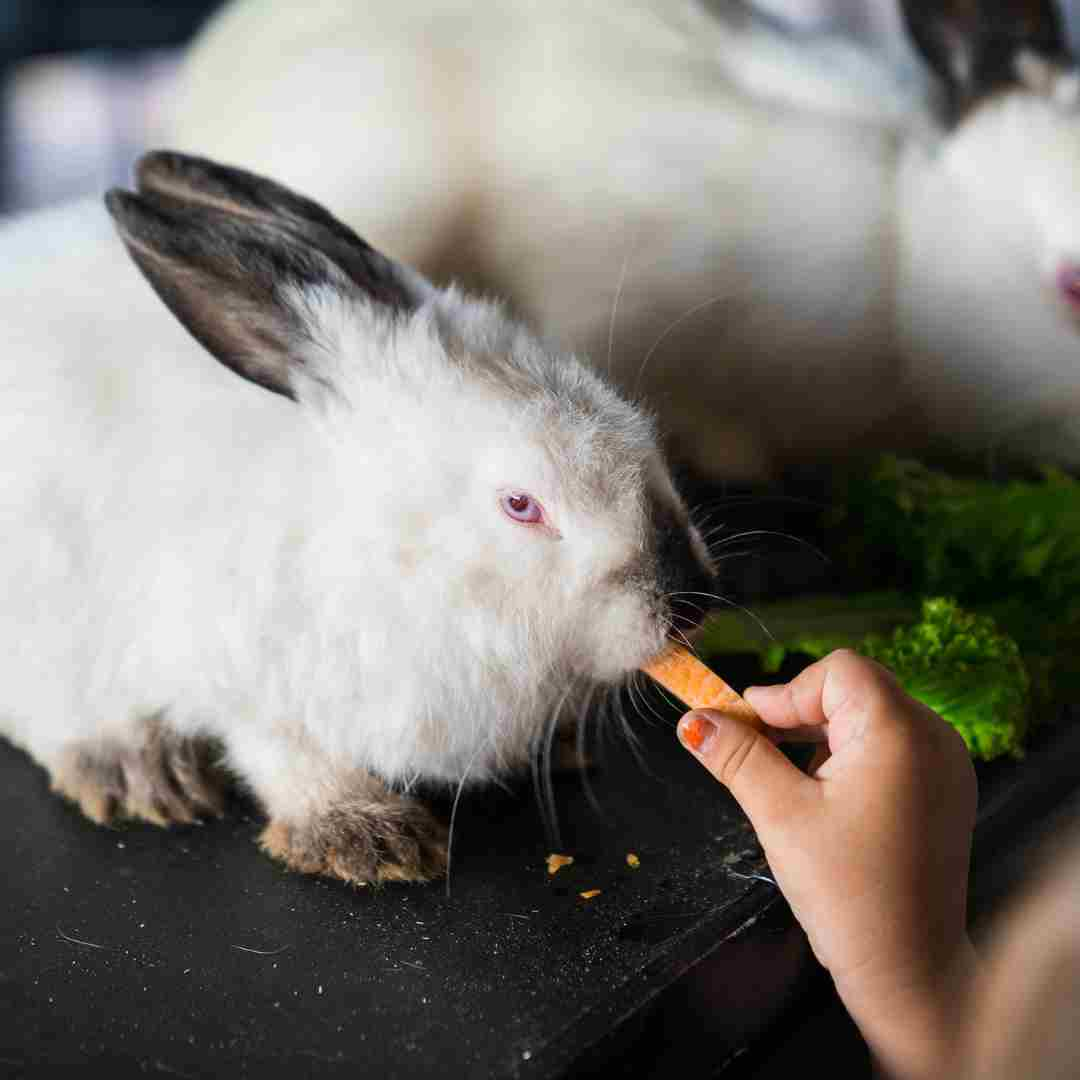Table of Contents
Overview
How to Spot a Potential Rabbit Bite
How to Handle a Bite from Your Rabbit
Getting Your Rabbit to Stop Biting
Typical Causes of Rabbit Bite
How to Deal with Young Children's Rabbit Biting Behaviour
Q&A
In summary
Overview
Are rabbits known to bite? It's a question that many pet owners have, particularly those who are thinking of getting a rabbit for the first time. Although they are sometimes thought of as kind, cuddly animals, rabbits can also be erratic and have been known to bite when they feel uneasy or threatened. Thankfully, biting behaviour in rabbits can be avoided and controlled, and knowing why they bite will help you provide a secure and comfortable environment for your pet. This post will cover the causes of rabbit bites, methods for preventing them, and what to do in the case that your pet does bite.
How to Spot a Potential Rabbit Bite
Although they are usually calm and peaceful creatures, rabbits have the ability to bite if they feel afraid or threatened. In order to take precautions against a rabbit biting, it's critical to be able to identify the warning indications.
When a rabbit flattens its ears against its head, it is one of the most common indicators that it is preparing to bite. This indicates that the rabbit is getting ready to protect itself because it feels afraid or threatened. It's crucial to move aside and allow the rabbit space if you observe this behaviour.
If a rabbit starts to thud its hind legs, that's another clue it's ready to bite. This is a red flag that the bunny is upset and might be ready to strike. It's crucial to get away from the rabbit and give it some space to calm down if you observe this behaviour.
Ultimately, a rabbit is about to bite if it starts to lunge or nip at you. It's crucial to step away from the rabbit and give it some room if you observe this behaviour.
These are warning indicators that you can watch out for to assist avoid getting bitten by a rabbit. It's crucial to move away and give the rabbit space if you observe any of these behaviours.
How to Handle a Bite from Your Rabbit
It's critical to maintain your composure and take the required actions to protect yourself and your rabbit in the event that it bites you.
Determine the bite's severity first. You might be able to take care of the bite at home if it's small. After washing the wound with soap and water, smear it with an antibiotic cream. See a doctor if the bite is more serious.
Second, figure out why you were bit by your rabbit. Rabbits can bite for a number of causes, including as anger, fear, or territoriality. Try to create a more comfortable environment for your terrified bunny. Give them a secure area to live, like a cage or hutch, and make sure they have lots of toys and things to do to pass the time. It's critical to take action to change aggressive or territorial behaviour in your rabbit. Consult an animal behaviourist or veterinarian for guidance on how to manage the circumstance.
Lastly, take action to stop bites in the future. Make sure you treat your bunny with kindness and consideration. Steer clear of abrupt movements or loud noises that could frighten them. Additionally, to assist lessen aggressive behaviour, make sure your rabbit has been neutered or spayed.
You can contribute to keeping yourself and your rabbit safe and happy by taking the actions listed here.
Getting Your Rabbit to Stop Biting
It can be difficult to teach your rabbit not to bite, but with perseverance and patience, it is achievable. Here are some pointers to get you going:
1. Recognise the source of your rabbit's bite. Many factors, such as fear, territoriality, or just plain curiosity, might lead rabbits to bite. It's critical to give your bunny a safe and secure space if they are biting out of fear.
2. Offer suitable chew toys. Since chewing is a normal behaviour for rabbits, it's critical to supply them items that will satiate their chewing urge. This will assist in diverting their biting habits from you to the toys.
3. Make use of encouragement. Give your rabbit a treat or some verbal praise when they don't bite. They will be more likely to repeat the desired behaviour if they receive reinforcement for it.
4. Maintain consistency. It's critical to train your bunny consistently and to resist giving in to its biting tendencies. If you give in, your rabbit will grow to believe that biting is okay and will carry on with the behaviour.
5. Show patience. It may require care and effort to teach your rabbit not to bite. Maintaining consistency and persevering if your rabbit doesn't respond right away are crucial.
You may assist train your rabbit to avoid biting by adhering to these guidelines. You may teach your rabbit to stop biting you and to move their biting behaviour to suitable chew toys by being patient and consistent with them.
Typical Causes of Rabbit Bite
Rabbits often bite, and in order to stop them from doing so, it's critical to know why they do it. Rabbits frequently bite for a variety of causes, such as pain, fear, and territoriality.
A common cause of rabbit bites is fear. A rabbit may bite as a defence mechanism if it senses danger or fear. This is particularly true if the rabbit is unfamiliar with its surroundings or is not accustomed to being handled. When attempting to engage with rabbits, it's necessary to handle them gently and give them some time to adjust to their environment.
Territoriality is yet another frequent explanation for rabbit bites. Because they are inherently territorial creatures, rabbits may bite if they sense that their territory is being violated. This is particularly true if the rabbit is unfamiliar with its surroundings or is not accustomed to being handled. When attempting to engage with rabbits, it's necessary to handle them gently and give them some time to adjust to their environment.
Another frequent cause of rabbit bites is pain. A rabbit may bite in self-defense if it is in discomfort. This is particularly true if the rabbit is unfamiliar with its surroundings or is not accustomed to being handled. When attempting to engage with rabbits, it's necessary to handle them gently and give them some time to adjust to their environment. Furthermore, if the rabbit seems to be in pain, it's critical to take it to the veterinarian.
In conclusion, fear, territoriality, and pain are among the common causes of rabbit bites. When attempting to engage with rabbits, it's necessary to handle them gently and give them some time to adjust to their environment. Furthermore, if the rabbit seems to be in pain, it's critical to take it to the veterinarian.
How to Deal with Young Children's Rabbit Biting Behaviour
Tiny children could be tempted to handle rabbits improperly, which could result in them biting. To stop this kind of behaviour, it is crucial to teach kids how to appropriately interact with rabbits.
Priority should be given to making sure the rabbit feels safe and at ease in its surroundings. A safe, secure enclosure with plenty of room for movement is the ideal home for rabbits. Additionally, the rabbit's enclosure needs to be kept tidy and free of any sharp things that could harm it.
Second, it's critical to instruct kids on appropriate rabbit interaction. It is important to teach kids to never pick up or handle the bunny too tightly, and to approach it cautiously and softly. Additionally, they should be trained never to tug on the rabbit's tail or fur as this can upset it and make it bite.
Thirdly, it's critical to keep an eye on kids while they're interacting with the rabbit. This will lessen the possibility of the rabbit being mistreated or handled improperly. It's crucial to take the child out of the environment right away if the rabbit gets upset or starts biting.
To keep the rabbit occupied, it's crucial to give it an abundance of toys and activities. By doing this, you can prevent the rabbit from getting restless and angry, which might cause it to start biting.
By using these suggestions, parents and other adults may ensure that their kids can engage with rabbits in a safe and appropriate manner and stop them from biting.
Q&A
1. Are rabbits known to bite?
Yes, when they feel afraid or attacked, rabbits will bite.
2. How do I stop my bunny from biting?
Make sure to handle your rabbit softly and refrain from making abrupt movements to prevent them from biting. To keep them occupied, give them an abundance of toys and activities.
3. What should I do if I am bitten by my rabbit?
Try not to panic if your bunny attacks you, and take your time getting away. In the event that the bite is serious, get medical help.
4. Are bites from rabbits harmful?
If a rabbit bite becomes infected, it might become dangerous. It's critical to clean the wound after being bitten and, if required, seek medical assistance.
5. How can I determine whether my bunny is being aggressive?
Rabbits that exhibit aggressive behaviours may hiss, growl, or lunge. It is better to leave your rabbit alone and give them some space if they exhibit any of these behaviours.
In summary
In conclusion, unless they are provoked or perceive a threat, rabbits usually do not bite. When a rabbit bites, it usually indicates that it is afraid or uneasy. It's crucial to treat rabbits with kindness and to provide them with a cosy, secure habitat.
